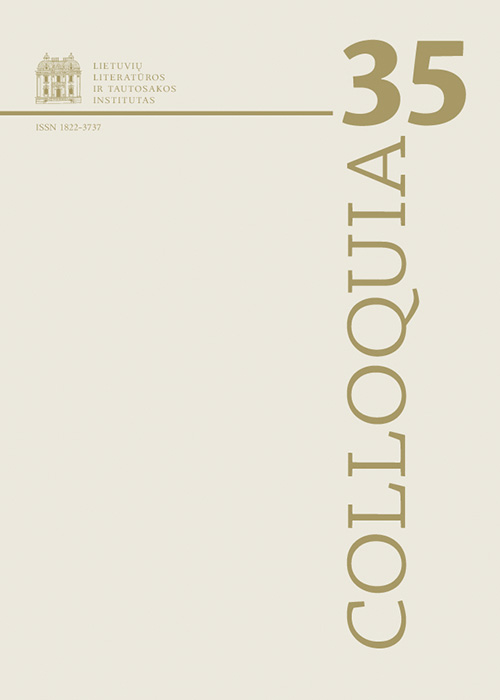The Ecological Potential of Vytautas Petkevičius’s Didysis medžiotojas Mikas Pupkus (The Great Hunter Mikas Pupkus)
Abstract
Drawing on Hubert Zapf’s view of literature as cultural-ecological potential and its manifestation in three functions (critical metadiscourse, imaginative counterdiscourse, and reintegrative interdiscourse), the author of this article offers a new interpretation of Vytautas Petkevičius’s children’s book Didysis medžiotojas Mikas Pupkas (The Great Hunter Mikas Pupkus, 1969). She also refers to a Norwegian theoretical model according to which it is possible to identify a subject’s relationship to nature and to localize it within a system of coordinates – an axis of meaning based on the oppositions nature worship/problematization of nature and anthropocentric horizon/biocentric horizon. Mitunevičiūtė argues that, even though it might have served the critical metadiscursive function, the potential encoded in this parody of hunting and exposure of the hunter’s image remains unexploited. While Petkevičius posits “humane” hunting as a possible means of regulating the balance of nature and suggests its complete denial, he does not carry this project to the end. The devastation of nature in the land of Nylon and the glaring consequences of ecological catastrophe represented in the work fulfill the function of representative antidiscourse. As an effective ecopedagogical tool capable of shaping young readers’ thinking, worldviews, and emotional and cognitive understanding, and of integrating ecological ideas into their cognitive field, Didysis medžiotojas Mikas Pupkus serves a reintegrative interdiscursive function. The author of the article argues that this function also has a broader application: while the work appeared in an era that was not conducive to the expression of ecological thinking, it became a vehicle for the expression of ecological ideas, helping to integrate them into the broader cultural field. The article focuses on how the subject’s relationship to nature changes depending on the work’s shifting intonations, and on how the subject acts in the world represented. With the movement from anthropocentrism to biocentrism within the general space of the work, this relationship remains ambiguous.
Downloads
Most read articles by the same author(s)
- Jurga Sadauskienė, A New Ethnomusicological Monograph: On Tradition in a Contemporary Way, On Community in a Global Way, and On Amateurism in a Professional Way , Colloquia: Vol. 45 (2020)
- Birutė Avižinienė, Literature and Its Authors in the Interwar Lithuanian Radio Programs , Colloquia: Vol. 46 (2021)
- Jochen Schimmang, The Tense Muscles of a Fanatic (Antanas Škėma, The White Shroud) , Colloquia: Vol. 38 (2017)
- Inga Mitunevičiūtė, The Ecological Potential of Vytautas Petkevičius’s Didysis medžiotojas Mikas Pupkus (The Great Hunter Mikas Pupkus) , Colloquia: Vol. 35 (2015)
- Rita Tūtlytė, An Attempt to Reconstruct the Generation of Žemininkai: Benediktas Labėnas , Colloquia: Vol. 49 (2022)
- Dalia Jakaitė, Openness of Existential Temporal Experiences to (Non)Being: The Poetry of Vaidotas Daunys and Valdas Gedgaudas , Colloquia: Vol. 36 (2016)
- Violeta Kelertas, A discussion on methodology for researching soviet literary space (Concluding discussion of the conference “Literary Field Under the Communist Regime: Structure, Functions, Illusio,” October 7–9, 2015. , Colloquia: Vol. 35 (2015)
- Gitana Vanagaitė, Uncles and Aunts by Vaižgantas in Literary History, Cinema and Theatre , Colloquia: Vol. 41 (2018)
- Akvilė Šimėnienė, Feminist Phenomenology in the Criticism of Birutė Ciplijauskaitė , Colloquia: Vol. 38 (2017)
- Giedrė Šmitienė, “I Smile Too When I Think of You”: The Beginning of the Friendship between Bronė Jacevičiūtė-Jėčiūtė and Janina Degutytė. Intermedial Source and Initial Research of the Relationship , Colloquia: Vol. 52 (2023): Colloquia




